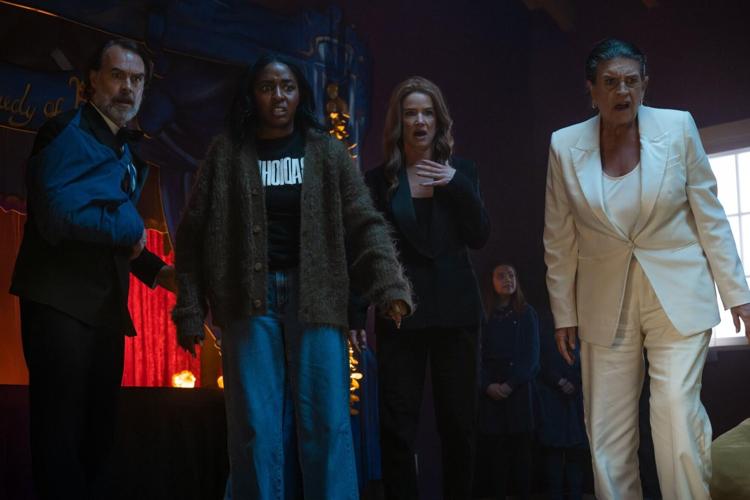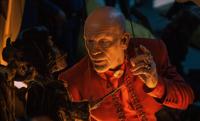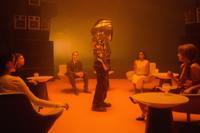Over the past few years, a term that has been thrown out in the media a lot is "cult of personality," which has been described as a kind of celebrity worship. This term has been applied mainly to President Donald Trump who became known nationally as a TV star on the reality competition show called The Apprentice (2004). Trump was a celebrity. He didn't have the fame or adoration as some of the biggest pop stars, but his 2016, 2020 and even 2024 Presidential campaigns have developed a following, collectively named "MAGA" from Trump's slogan of "Make America Great Again." That following is so dedicated and loyal that they don't question anything he says or does, even if he says or does illegal things. He can even rally them into the same. The U.S. Capitol riots or insurrection on January 6, 2021 was an example.
Mark Anthony Green is the writer and director of this feature. I doubt that he had Trump much in mind when he was making it. Green is himself a former magazine writer who wrote a lot about celebrities. From what I could tell, he avoided political figures. He instead focused on actors, musicians and sports stars. Green published articles on a variety of people, but scanning his profile page on GQ magazine's website, he leaned more toward African American celebrities. It's odd that the celebrity in question in this narrative isn't a person of color. There are references to celebrities who come from minority backgrounds like Freddie Mercury and Michael Jackson. Yet, the celebrity in this film is ostensibly a White or Caucasian man.

Ayo Edebiri (The Bear and Teenage Mutant Ninja Turtles: Mutant Mayhem) stars as Ariel Ecton, a journalist at a magazine who pitches stories that are really interesting, but she doesn't get a chance to write them or whatever work she does doesn't result in her getting a byline. Thus, she's not able to make a name for herself. She wants to author a book, but she feels constantly sidelined. However, her boyfriend or friend who is a boy, played by Young Mazino (The Last of Us and Beef) tells her that she's middle, meaning her life has been average and normal, nothing exceptional or tragic.
When a 90's pop star who was really big but who has been out of the limelight for 30 years, out of the blue re-emerges and announces a new album, Ariel is invited to attend along with five others to an exclusive party out in the deserts of Utah. Ariel sees it as an opportunity to report on something exceptional, but she keeps getting sidelined by her boss, Stan Sullivan, played by Murray Bartlett (The Last of Us and The White Lotus). While at the isolated, pop star's ranch, Ariel starts to get the impression that are in the midst of a scary cult.

John Malkovich (In the Line of Fire and Being John Malkovich) co-stars as Alfred Moretti, the pop star in question who is compared to Freddie Mercury and Michael Jackson in terms of his album sales. In terms of his style, he's coded as almost being queer or flamboyant, much in the way of Elton John. Yet, his sexuality is never truly explored. He's eccentric and quirky to the max, but he's also meant to be this charismatic leader, as most cult leaders tend to be. He could also just be a messenger or a celebrity who has become the face of this cult, such as we've seen in cults or alternative religions like Scientology or Mormonism. It's not lost that this film is set in Utah, the home of Mormonism.
Green's narrative is ostensibly a critique of cults and alternative religions, if not all religions. However, there isn't much explanation of what Moretti's religion called Levelism actually is or its origins. It's suggested that Moretti himself invented it, but he denies it. If he didn't, if he's not the L. Ron Hubbard of this thing, then it's a wonder of how Moretti came to Levelism and what attracted him to it. If he's going to go to the lengths of evangelism that he does, we should learn more of his connection to this religion.

Overall, it's also meant to be a critique of what people will allow if it involves them being close or closer to a big-time celebrity. It could be an examination of sycophancy, but sycophants suck up to someone like a celebrity because they think they'll get something, usually some kind of advantage. Yet, this film never explains or explores what the sycophants get out of it. It's odd because at one point, Ariel wants to do a separate story about the sycophants and not Moretti, but that idea is shut down by Stan. This film is a demonstration of how Mark Anthony Green is basically the Stan of this particular film.
This is only egregious in the case of actors like Amber Midthunder (Prey and Roswell, New Mexico) or Tatanka Means (Horizon: An American Saga and Killers of the Flower Moon). Both Midthunder and Means are Native American or First Nations people who have their own culture, tribe and particular religious beliefs. Midthunder and Means' characters must also share that same background. For those two characters to be apart of this cult would be an interesting story in and of itself because it would mean a break from their Native American beliefs or practices. What brought them here and why are they going along with this? Those are more compelling questions that this film skips over, even though the protagonist, Ariel herself, has it on her mind.

Rated R for violent content, grisly image, language, sexual material and brief graphic nudity.
Running Time: 1 hr. and 43 mins.
In theaters.













